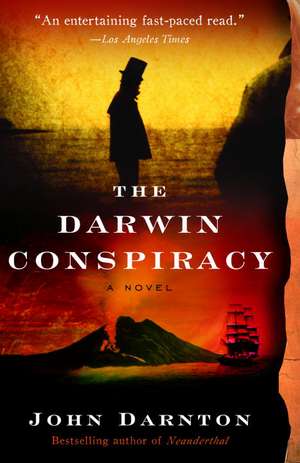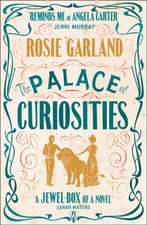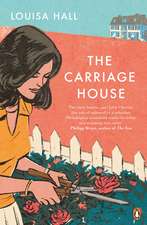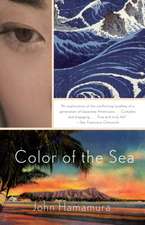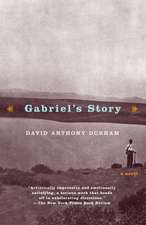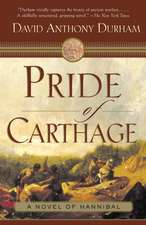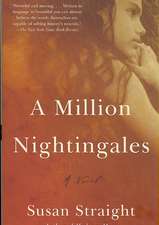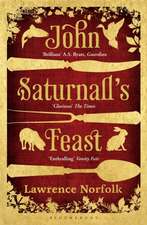The Darwin Conspiracy
Autor John Darntonen Limba Engleză Paperback – 31 aug 2006
Preț: 96.93 lei
Nou
Puncte Express: 145
Preț estimativ în valută:
18.55€ • 19.42$ • 15.35£
18.55€ • 19.42$ • 15.35£
Carte disponibilă
Livrare economică 15-29 martie
Preluare comenzi: 021 569.72.76
Specificații
ISBN-13: 9781400034833
ISBN-10: 1400034833
Pagini: 309
Dimensiuni: 147 x 192 x 18 mm
Greutate: 0.24 kg
Ediția:Reprint
Editura: Anchor Books
ISBN-10: 1400034833
Pagini: 309
Dimensiuni: 147 x 192 x 18 mm
Greutate: 0.24 kg
Ediția:Reprint
Editura: Anchor Books
Notă biografică
John Darnton has worked for thirty-nine years as a reporter, editor, and foreign correspondent for The New York Times. He was awarded two George Polk Awards for his coverage of Africa and Eastern Europe, and the Pulitzer Prize for his stories smuggled out of Poland during the period of martial law. He lives in New York.
Extras
Hugh spotted the boat while it was still a dot on the horizon and watched it approach the island, making a wide, white arc. He shaded his eyes but still he had to squint against the shards of reflected light. Already the morning sun had cut through the haze to lay a shimmering sword on the water.
All around him the birds swooped and darted in the cacophonous morning feeding—hundreds of them, screaming swallow-tailed gulls, brown noddies, boobies homing in with fish dangling in their beaks. A frigate circled behind a gull, yanked its tail feathers to open the gullet, then made a corkscrew dive to grab the catch—a flash of acrobatic violence that had long since ceased to amaze him.
The boat appeared to be a panga, but that was odd: supplies weren’t due for days. Hugh fixed his stare on the dark silhouette of the driver. He looked like Raoul, the way he leaned into the wind, one arm trailing back on the throttle.
Hugh dropped his canvas tool bag near the mist net and started down. The black rocks were streaked white and gray with guano, which stank in the windless air and made the lava slippery, but he knew the footholds perfectly. The heat pressed down on him.
When he reached the bottom of the cliffside, Raoul was already there. He idled the swaying panga a few feet from the landing rock, a narrow ledge that was washed by an ankle-deep wave every few seconds.
“Amigo,” shouted Raoul, grinning behind dark glasses.
“Hey, Cowboy,” said Hugh. He coughed to clear his throat—it had been a long time since he had talked to anybody.
Raoul was wearing pressed khaki shorts, a Yankees cap over his thick black hair at a jaunty angle, and a dark blue jersey with the insignia of the Galapagos National Park on the left breast pocket.
“Just stopping by,” he said. “What’s new?”
“Not much.”
“I thought you will be totally crazy by now.” His English was almost perfect but sometimes an odd phrasing gave him away.
“No, not totally. But I’m working on it.”
“So, how’s the ermitano?”
“The what?”
“Ermitano,” Raoul repeated. “How do you say that?”
“Hermit.”
Raoul nodded and regarded him closely. “So, how’re you doing?”
“Fine,” lied Hugh.
Raoul looked away.
“I brought two chimbuzos.” He gestured with his chin to two water barrels strapped to the mid-seat. “Help me to deliver them.”
Hugh leapt into the boat, unstrapped a barrel, and hoisted it over his right shoulder. The weight threw off his balance and he tottered like a drunken sailor and almost fell into the water.
“Not like that,” said Raoul. “Put them overboard and shove them to the mat. Then you climb up and pick them up.”
The mat, short for “welcome mat,” was the nickname the researchers called the rocky ledge. Raoul had hung around them so long, help- ing out now and then because he admired what they were doing, that he was picking up their lingo.
Hugh finally got both barrels ashore and lugged them up to the beginning of the path. He was dripping with sweat by the time he returned.
“Want to come on shore, stay a while?” he asked. The offer was disingenuous. The water was too deep to anchor—more than eighty feet straight down—and if the panga docked, the waves would smash it against the rocks.
“I can’t stay. I just wanted to say hello. How’re your crazy birds— getting thirsty, no?”
“The heat’s rough on them. Some are dying.”
Raoul shook his head. “How many days without rain?” he asked.
“Today is two hundred something, two hundred twenty-five, I think.”
Raoul whistled and shook his head again, a fatalistic gesture, and lit a cigarette.
They talked for a while about the study. Raoul was always eager to hear how it was going. He had once said that if he came back to earth a second time that was what he wanted to do—camp out and study birds. Hugh thought that Raoul had no idea what it was really like—the solitude, the fatigue and boredom and endless repetition of extremes, boiling during the day and then at night when the temperature dropped forty degrees, lying in your sleeping bag and shivering so violently you can’t go to sleep even though you’re exhausted. Anything can sound glamorous until you do it.
“Say,” Raoul said lightly, “I hear you’re getting company. Two more guys coming out.”
“Yeah—so I’m told.”
Raoul looked quizzical.
“Sat phone,” explained Hugh. “Satellite. I got a call day before yesterday. The thing scared the shit out of me when it rang.”
“Do you know them?”
“No, I don’t think so. I don’t know anybody in the project, really.”
“What are their names?”
“I don’t know.”
“You didn’t ask?”
“No.”
Raoul paused a moment, then looked at him closely. “Hombre, you okay? You don’t look so good.”
“No, I’m fine.” Pause. “Thanks.”
“All that pink skin.”
That was a joke. Hugh had been burned and tanned so many times that his skin had turned a leathery brown. His lips were swollen and cracked, despite the Chap Stick, and his eyebrows were bleached blond.
“You think you ready to share this paradise with other people?”
“Sure thing,” said Hugh, but his voice sounded uncertain.
Raoul turned and looked out to sea. Far away the dark profile of a ship could be seen moving quickly with a funnel of gulls circling it.
“The Neptune,” he said. “More tourists for the Enchanted Isles.”
“Whoever thought that one up deserves a medal,” said Hugh. He could see by the shadow that crossed Raoul’s face that the remark was hurtful. The depth of Equadorean nationalism always amazed him. He smiled, pretending he was joking.
“More work for me.” Raoul shrugged. “Well, tengo que trabajar.” He flicked his cigarette way off into the water and gave a little wave from the hip. “Ciao.”
“Ciao. Thanks for the water.”
“Don’t drink it all right now.” Raoul grinned as he turned the panga, gunned the motor, and pulled out so fast the bow rose up like a surfboard. Hugh stared after him until the boat disappeared behind the island.
He carried the chimbuzos one at a time up the long path that wound up the south face of the volcano and then down past the campsite into the bottom of the crater, where in theory it was a degree or two cooler—but only in theory. On hot days, even here, he had seen the green-footed boobies shifting from one webbed foot to the other on the scorching rocks.
He looked at his watch. Shit. Almost seven o’clock. He had forgotten about the mist net—he was sure he had seen a bird trapped there, maybe two. He had to hurry and free them before they died in the quickening morning heat. Once, months ago, before he got the routine down, he had lost a bird that way. They were surprisingly resilient if you handled them right, but if you made a mistake, like leaving them trapped in the mist net too long, they were as fragile as twigs. That time, he had recorded the death dutifully in the log, without explanation, in a single concocted word: “ornithocide.”
At the top of the island it was even hotter. He grabbed his bag and looked at the net. Sure enough, there were two birds, small dark cocoons that rippled as he touched them. He reached in and held one to his chest while he deftly lifted off the black threads so thin they caught the birds in flight. As he untangled the mesh from the feathers he suddenly had a memory: playing badminton as a young boy during long summer evenings, those moments when the plastic bird hurled into the net and had to be carefully extracted.
He now saw the finch’s color, black mottled with gray and dusty white. A cactus finch—Geospiza scandens—very common, no surprise there. He held it tightly in his left fist and raised it to look at it. The eyes, deep brown, looked back, and he could feel the tiny heart tickling his palm. He checked the bands—a green and black one on the left leg and a blue one on the right—and identified him in the register. Number ACU-906. A previous researcher had jotted down a nickname, Smooches, in a rounded, girlish American script.
After all this time Hugh still had trouble identifying more than a dozen finches by their nicknames, the ones that hung around the campsite. Spotting them was a point of pride with the researchers, he gathered; they told stories of sitting around the rocks and rattling off the names of thirty or forty at a shot. “You’ll get to know them in no time,” he had been told at the farewell pep talk by Peter Simons, a legend in the field. “Just stretch out your arm and they’ll land on it.” That part was true at least. He was pleasantly surprised the first week when he was measuring a small finch and another came to perch on his bare knee and peer at him, its head cocking from one side to the other. At times like that they seemed curious and intelligent. But at other times—like when he forgot to cover the coffeepot and a bird almost dove in and drowned—it was hard not to think of them as stupid.
That was back before Victor left. At first it was a relief to be alone—solitude was what he had been looking for, part of his penitence—but as weeks stretched into months, the loneliness he had sought became almost too much to bear. Then when the rainy season didn’t come and the lava island turned into a black frying pan stuck way out in the ocean, at times he actually wondered if he could keep going. But of course he did. He had known he would—in that way at least, in brute staying power, he was strong. It was his psyche that was brittle.
He pulled out a pair of calipers and measured the bird’s wing and wrote it in the notebook, tattered over the years and swollen from the rain despite its waterproof cover. The bird froze as he measured its beak—the all-important beak—its length, width, and depth. Since 1973, when Simons and his wife, Agatha, first came here, generations of graduate students had braved the miserable conditions to measure thousands upon thousands of beaks and search for meaning among the minute variations.
Hugh freed the bird and it flew off a few yards and landed on a cactus, shaking its feathers. He recorded the second bird and walked around to the north rim to check the traps. He could tell by looking that none had sprung shut. He went back to the campsite and fixed breakfast, watery scrambled eggs made from powder and weak coffee from used grinds. Then he went to the top of the island again to rest and look out over the blue-green water, choppy with waves from the treacherous currents. He sat in his familiar place—the smooth rocks, already hot, formed a throne that fit his rear. He could see for miles.
Darwin was no fool. He didn’t like it here either.
Hugh sometimes talked to himself. Or—even stranger—sometimes he couldn’t tell whether he had been thinking the words or saying them aloud. Lately, his interior monologues were becoming oddly disjointed, especially during the long hours when he worked hard under the hot sun. Half thoughts flashed through his mind, phrases repeating themselves over and over, admonitions and observations from himself to himself, sometimes addressed in the second person, such as: If it was Hell you’re looking for, buddy, you’ve come to the right place.
And it had been Hell that he’d looked for, no doubt about that. Even the name of the island—Sin Nombre—had exerted an attraction the moment he heard it.
So how about it? Was he willing to share this place—this paradise, he scoffed to himself, maybe out loud—with other people?
From the Hardcover edition.
All around him the birds swooped and darted in the cacophonous morning feeding—hundreds of them, screaming swallow-tailed gulls, brown noddies, boobies homing in with fish dangling in their beaks. A frigate circled behind a gull, yanked its tail feathers to open the gullet, then made a corkscrew dive to grab the catch—a flash of acrobatic violence that had long since ceased to amaze him.
The boat appeared to be a panga, but that was odd: supplies weren’t due for days. Hugh fixed his stare on the dark silhouette of the driver. He looked like Raoul, the way he leaned into the wind, one arm trailing back on the throttle.
Hugh dropped his canvas tool bag near the mist net and started down. The black rocks were streaked white and gray with guano, which stank in the windless air and made the lava slippery, but he knew the footholds perfectly. The heat pressed down on him.
When he reached the bottom of the cliffside, Raoul was already there. He idled the swaying panga a few feet from the landing rock, a narrow ledge that was washed by an ankle-deep wave every few seconds.
“Amigo,” shouted Raoul, grinning behind dark glasses.
“Hey, Cowboy,” said Hugh. He coughed to clear his throat—it had been a long time since he had talked to anybody.
Raoul was wearing pressed khaki shorts, a Yankees cap over his thick black hair at a jaunty angle, and a dark blue jersey with the insignia of the Galapagos National Park on the left breast pocket.
“Just stopping by,” he said. “What’s new?”
“Not much.”
“I thought you will be totally crazy by now.” His English was almost perfect but sometimes an odd phrasing gave him away.
“No, not totally. But I’m working on it.”
“So, how’s the ermitano?”
“The what?”
“Ermitano,” Raoul repeated. “How do you say that?”
“Hermit.”
Raoul nodded and regarded him closely. “So, how’re you doing?”
“Fine,” lied Hugh.
Raoul looked away.
“I brought two chimbuzos.” He gestured with his chin to two water barrels strapped to the mid-seat. “Help me to deliver them.”
Hugh leapt into the boat, unstrapped a barrel, and hoisted it over his right shoulder. The weight threw off his balance and he tottered like a drunken sailor and almost fell into the water.
“Not like that,” said Raoul. “Put them overboard and shove them to the mat. Then you climb up and pick them up.”
The mat, short for “welcome mat,” was the nickname the researchers called the rocky ledge. Raoul had hung around them so long, help- ing out now and then because he admired what they were doing, that he was picking up their lingo.
Hugh finally got both barrels ashore and lugged them up to the beginning of the path. He was dripping with sweat by the time he returned.
“Want to come on shore, stay a while?” he asked. The offer was disingenuous. The water was too deep to anchor—more than eighty feet straight down—and if the panga docked, the waves would smash it against the rocks.
“I can’t stay. I just wanted to say hello. How’re your crazy birds— getting thirsty, no?”
“The heat’s rough on them. Some are dying.”
Raoul shook his head. “How many days without rain?” he asked.
“Today is two hundred something, two hundred twenty-five, I think.”
Raoul whistled and shook his head again, a fatalistic gesture, and lit a cigarette.
They talked for a while about the study. Raoul was always eager to hear how it was going. He had once said that if he came back to earth a second time that was what he wanted to do—camp out and study birds. Hugh thought that Raoul had no idea what it was really like—the solitude, the fatigue and boredom and endless repetition of extremes, boiling during the day and then at night when the temperature dropped forty degrees, lying in your sleeping bag and shivering so violently you can’t go to sleep even though you’re exhausted. Anything can sound glamorous until you do it.
“Say,” Raoul said lightly, “I hear you’re getting company. Two more guys coming out.”
“Yeah—so I’m told.”
Raoul looked quizzical.
“Sat phone,” explained Hugh. “Satellite. I got a call day before yesterday. The thing scared the shit out of me when it rang.”
“Do you know them?”
“No, I don’t think so. I don’t know anybody in the project, really.”
“What are their names?”
“I don’t know.”
“You didn’t ask?”
“No.”
Raoul paused a moment, then looked at him closely. “Hombre, you okay? You don’t look so good.”
“No, I’m fine.” Pause. “Thanks.”
“All that pink skin.”
That was a joke. Hugh had been burned and tanned so many times that his skin had turned a leathery brown. His lips were swollen and cracked, despite the Chap Stick, and his eyebrows were bleached blond.
“You think you ready to share this paradise with other people?”
“Sure thing,” said Hugh, but his voice sounded uncertain.
Raoul turned and looked out to sea. Far away the dark profile of a ship could be seen moving quickly with a funnel of gulls circling it.
“The Neptune,” he said. “More tourists for the Enchanted Isles.”
“Whoever thought that one up deserves a medal,” said Hugh. He could see by the shadow that crossed Raoul’s face that the remark was hurtful. The depth of Equadorean nationalism always amazed him. He smiled, pretending he was joking.
“More work for me.” Raoul shrugged. “Well, tengo que trabajar.” He flicked his cigarette way off into the water and gave a little wave from the hip. “Ciao.”
“Ciao. Thanks for the water.”
“Don’t drink it all right now.” Raoul grinned as he turned the panga, gunned the motor, and pulled out so fast the bow rose up like a surfboard. Hugh stared after him until the boat disappeared behind the island.
He carried the chimbuzos one at a time up the long path that wound up the south face of the volcano and then down past the campsite into the bottom of the crater, where in theory it was a degree or two cooler—but only in theory. On hot days, even here, he had seen the green-footed boobies shifting from one webbed foot to the other on the scorching rocks.
He looked at his watch. Shit. Almost seven o’clock. He had forgotten about the mist net—he was sure he had seen a bird trapped there, maybe two. He had to hurry and free them before they died in the quickening morning heat. Once, months ago, before he got the routine down, he had lost a bird that way. They were surprisingly resilient if you handled them right, but if you made a mistake, like leaving them trapped in the mist net too long, they were as fragile as twigs. That time, he had recorded the death dutifully in the log, without explanation, in a single concocted word: “ornithocide.”
At the top of the island it was even hotter. He grabbed his bag and looked at the net. Sure enough, there were two birds, small dark cocoons that rippled as he touched them. He reached in and held one to his chest while he deftly lifted off the black threads so thin they caught the birds in flight. As he untangled the mesh from the feathers he suddenly had a memory: playing badminton as a young boy during long summer evenings, those moments when the plastic bird hurled into the net and had to be carefully extracted.
He now saw the finch’s color, black mottled with gray and dusty white. A cactus finch—Geospiza scandens—very common, no surprise there. He held it tightly in his left fist and raised it to look at it. The eyes, deep brown, looked back, and he could feel the tiny heart tickling his palm. He checked the bands—a green and black one on the left leg and a blue one on the right—and identified him in the register. Number ACU-906. A previous researcher had jotted down a nickname, Smooches, in a rounded, girlish American script.
After all this time Hugh still had trouble identifying more than a dozen finches by their nicknames, the ones that hung around the campsite. Spotting them was a point of pride with the researchers, he gathered; they told stories of sitting around the rocks and rattling off the names of thirty or forty at a shot. “You’ll get to know them in no time,” he had been told at the farewell pep talk by Peter Simons, a legend in the field. “Just stretch out your arm and they’ll land on it.” That part was true at least. He was pleasantly surprised the first week when he was measuring a small finch and another came to perch on his bare knee and peer at him, its head cocking from one side to the other. At times like that they seemed curious and intelligent. But at other times—like when he forgot to cover the coffeepot and a bird almost dove in and drowned—it was hard not to think of them as stupid.
That was back before Victor left. At first it was a relief to be alone—solitude was what he had been looking for, part of his penitence—but as weeks stretched into months, the loneliness he had sought became almost too much to bear. Then when the rainy season didn’t come and the lava island turned into a black frying pan stuck way out in the ocean, at times he actually wondered if he could keep going. But of course he did. He had known he would—in that way at least, in brute staying power, he was strong. It was his psyche that was brittle.
He pulled out a pair of calipers and measured the bird’s wing and wrote it in the notebook, tattered over the years and swollen from the rain despite its waterproof cover. The bird froze as he measured its beak—the all-important beak—its length, width, and depth. Since 1973, when Simons and his wife, Agatha, first came here, generations of graduate students had braved the miserable conditions to measure thousands upon thousands of beaks and search for meaning among the minute variations.
Hugh freed the bird and it flew off a few yards and landed on a cactus, shaking its feathers. He recorded the second bird and walked around to the north rim to check the traps. He could tell by looking that none had sprung shut. He went back to the campsite and fixed breakfast, watery scrambled eggs made from powder and weak coffee from used grinds. Then he went to the top of the island again to rest and look out over the blue-green water, choppy with waves from the treacherous currents. He sat in his familiar place—the smooth rocks, already hot, formed a throne that fit his rear. He could see for miles.
Darwin was no fool. He didn’t like it here either.
Hugh sometimes talked to himself. Or—even stranger—sometimes he couldn’t tell whether he had been thinking the words or saying them aloud. Lately, his interior monologues were becoming oddly disjointed, especially during the long hours when he worked hard under the hot sun. Half thoughts flashed through his mind, phrases repeating themselves over and over, admonitions and observations from himself to himself, sometimes addressed in the second person, such as: If it was Hell you’re looking for, buddy, you’ve come to the right place.
And it had been Hell that he’d looked for, no doubt about that. Even the name of the island—Sin Nombre—had exerted an attraction the moment he heard it.
So how about it? Was he willing to share this place—this paradise, he scoffed to himself, maybe out loud—with other people?
From the Hardcover edition.
Recenzii
“An entertaining, fast-paced read.” –Los Angeles Times
“Darnton has playfully created and solved several mysteries revolving around events during Charles Darwin’s early voyage on the Beagle.” –The Boston Globe
“Darnton has a good feel for both the Victorian era and the modern scientific milieu.” –The New Yorker
“An elaborate scientific thriller, rich with detail and the pacing of a good murder mystery.” –Winston-Salem Journal
“A fast-paced, intriguing and exciting story.”
–The Decatur Daily
“Darnton has playfully created and solved several mysteries revolving around events during Charles Darwin’s early voyage on the Beagle.” –The Boston Globe
“Darnton has a good feel for both the Victorian era and the modern scientific milieu.” –The New Yorker
“An elaborate scientific thriller, rich with detail and the pacing of a good murder mystery.” –Winston-Salem Journal
“A fast-paced, intriguing and exciting story.”
–The Decatur Daily
Descriere
In this riveting new novel, bestselling author John Darnton transports readers to Victorian England and around the world to reveal the secrets of a legendary 19th-century figure.
